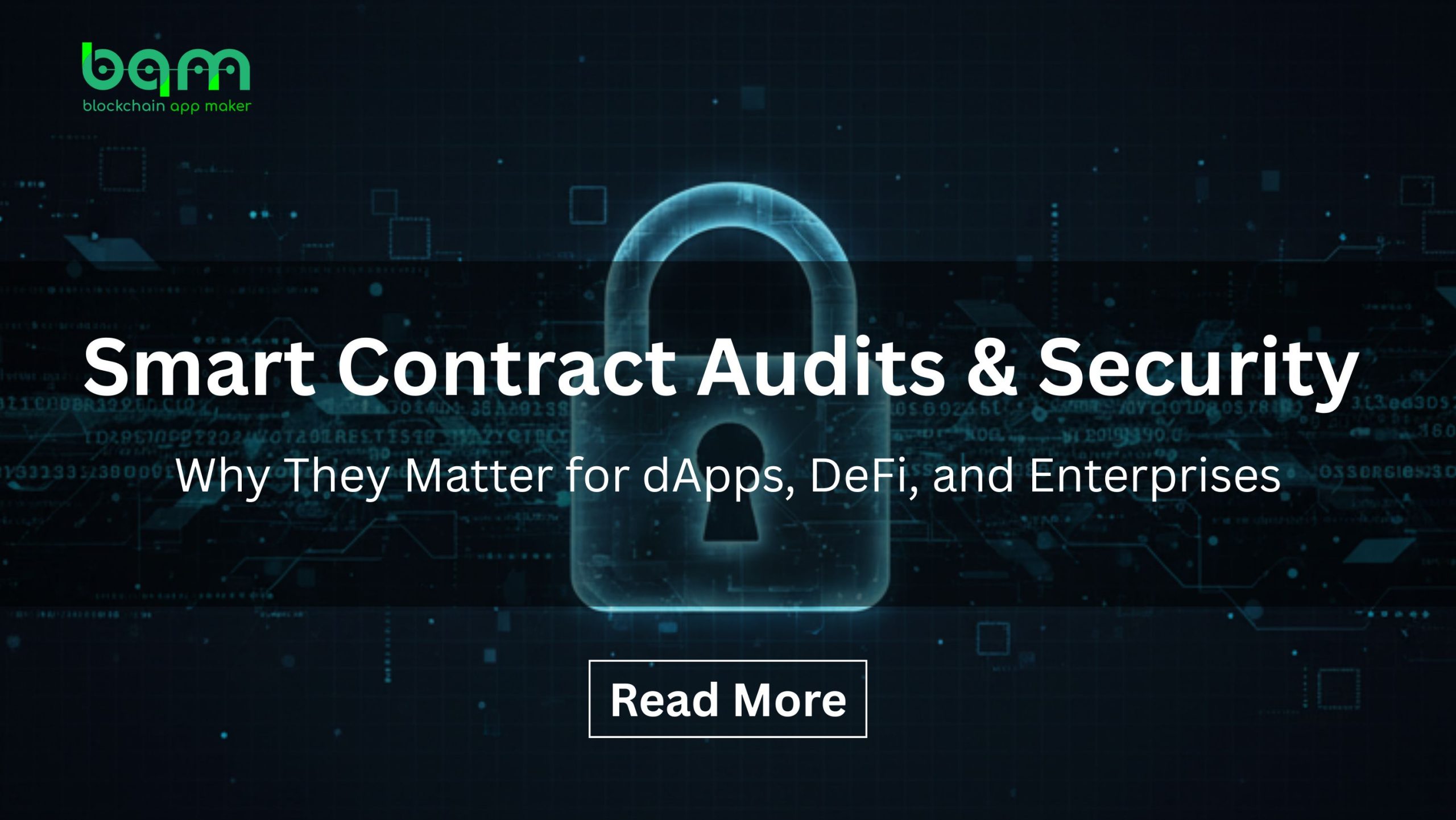Introduction: A Story of Innovation, Risk, and Trust
Imagine a blockchain company getting ready to introduce a state-of-the-art DeFi lending platform. The group has put out endless effort to create smart contracts that automate token distribution, staking, and lending, doing away with middlemen and offering previously unheard-of transparency.
Excitement is among investors. Those who are early adopters are waiting. It all appears to be excellent. However, a tiny, unnoticed vulnerability—an unchecked external call in the loan contract—is concealed beneath the lines of code. This small defect has the potential to cause millions of dollars in losses if it is misused.
Similar situations occur on a daily basis throughout the blockchain ecosystem. Smart contracts are the foundation of enterprise blockchain systems, NFT marketplaces, and DeFi protocols. Any imperfection, no matter how small, can have permanent effects on operations, finances, and reputation.
Smart contract audits are crucial in this situation. They serve as a link between innovation and security, guaranteeing that your code works as intended, safeguarding resources, and fostering stakeholder and user trust.
We go over why smart contract security is essential, common flaws in DeFi and dApps, the audit procedure, best practices, enterprise viewpoints, and how working with a reputable smart contract development company like Blockchain App Maker can protect your blockchain journey in this extensive guide.
Understanding Smart Contracts: The Foundation of Blockchain
Self-executing programs called smart contracts are found on blockchain networks such as Ethereum, Polygon, and Binance Smart Chain. They enable trustless operations for applications ranging from enterprise blockchain solutions to DeFi protocols and NFT platforms by automatically enforcing established rules without the need for middlemen.
Types of Smart Contracts
- ERC-20 Tokens: Fungible, standardized tokens used in governance, ICOs, and DeFi.
- ERC-721 tokens: Non-fungible tokens (NFTs) that represent distinct digital assets.
- ERC-1155 tokens: Multi-token standards that support both fungible and non-fungible assets
- DAO Governance Contracts: Decentralized voting and decision-making can be automated
- DeFi Protocol Contracts: Enable yield farming, lending, borrowing, and liquidity pools.
Key Features of Smart Contracts
- Automation: Eliminates the need for intermediaries.
- Transparency: Code and transactions that can be verified by the public.
- Immutability: Contracts cannot be changed once they are deployed.
- Security: Guarantees that requirements are fulfilled without the need for human involvement.
Despite their strength, these features also render smart contracts vulnerable to failure if they are not thoroughly examined and inspected.
Why Smart Contract Security Is Crucial
Errors in smart contract code are irreversible in blockchain systems. Smart contract exploits are irreversible and have the potential to cause significant financial and reputational harm, in contrast to traditional software that can be patched.
Risks of Insecure Smart Contracts
- Monetary Loss: Token balances can be manipulated or liquidity pools drained by exploits.
- Reputation Damage: Brand credibility declines, investors go out, and consumers lose faith.
- Regulatory Non-Compliance: Businesses may be subject to penalties or legal action.
- Operational Disruption: Users and stakeholders may be impacted by the failure of crucial business processes.
Insight: Strategic risk mitigation measures are crucial for maintaining trust in decentralized ecosystems, and smart contract audits are more than just security checks.
The Role of Smart Contract Audits
Before being deployed, a smart contract audit is a thorough assessment of blockchain code to find logic errors, vulnerabilities, and compliance gaps. It minimizes possible risks and guarantees that contracts operate as intended.
Objectives of a Smart Contract Audit
- The purpose of a smart contract audit is to identify and remove vulnerabilities.
- Verify the logic and functionality of the contract.
- Make sure the industry and regulations are followed.
- Avoid monetary and operational losses.
- Make suggestions for changes that can be put into practice.
For businesses implementing blockchain solutions and startups introducing DeFi protocols, audits are crucial since they provide assurance of dependability and trust.
Common Smart Contract Vulnerabilities in DeFi and dApps
Even well-audited code can have hidden flaws. Here are the most common vulnerabilities:
| Vulnerability | Description | Impact |
| Reentrancy Attacks | Malicious actors repeatedly call functions before the first execution completes. | Funds can be siphoned from liquidity pools or lending protocols. |
| Integer Overflow/Underflow | Arithmetic operations exceed variable limits. | Token supply manipulation, incorrect balances. |
| Access Control Issues | Improperly set permissions. | Unauthorized transfers or contract changes. |
| Front-Running Attacks | Attackers manipulate transaction ordering for profit. | Exploit price fluctuations, token swaps, or trading outcomes. |
| Unchecked External Calls | Vulnerable dependencies on external contracts or oracles. | Cascading failures or exploits. |
| Logic Flaws | Programming errors that create unintended behavior. | Contract executes incorrectly, causing operational losses. |
| Timestamp Dependence | Relying on block timestamps for critical logic. | Miners can manipulate outcomes. |
| Gas Limit Vulnerabilities | Transactions fail under heavy network load. | Contract execution halts or misbehaves. |
| Delegatecall Vulnerabilities | Unsecured delegate calls to external contracts. | Malicious code execution or asset theft. |
| Uninitialized Storage Variables | Variables not properly set before use. | Exploitable bugs leading to token loss or mismanagement. |
Smart Contract Audit Process: From Planning to Post-Deployment
A professional audit adheres to a series of steps:
- Definition of Scope
Describe the goals, dependencies, contract architecture, and business logic.
- Vulnerability scanning that is automated
Common vulnerabilities are swiftly identified by programs like Slither, Mythril, Echidna, and Oyente.
- Manual Code Review
Security professionals go line by line through logic, business rules, and integration points.
- Stress testing and simulation
To find performance or security problems, test contracts on testnet environments that mimic real-world situations.
- Reporting and Corrective Action
Record vulnerabilities according to their severity, offer suggestions for mitigation, and monitor their resolution.
- Certification and Re-Audit
Before deploying to the mainnet, make sure that every problem has been fixed. Additionally, some audits offer audit certificates for investor and regulatory trust.
- Post-Deployment Monitoring
Constantly keeping an eye out for irregularities, questionable activities, and any new vulnerabilities.
Smart Contract Security Best Practices
A proactive approach to security is crucial for corporations, startups, and DeFi platforms.
Comprehensive Checklist
- Perform both automated and manual pre-deployment audits.
- Adhere to standardized frameworks, such as OpenZeppelin.
- Put role-based access and multi-signature safeguards in place.
- First, deploy and test on testnets.
- Perform scenario simulations, penetration testing, and fuzzing.
- To take use of community testing, start bug bounty programs.
- Conduct an audit following each significant update or integration.
- Modular design and version control make updates simpler.
- Constant observation to manage risks in real time.
These safeguards protect assets and reputations by ensuring smart contracts are dependable, robust, and compliant.
Enterprise Perspective: Strategic Importance of Smart Contract Audits
For businesses, audits are essential for risk management, governance, and compliance in addition to security.
Enterprise Benefits
- Regulatory Compliance: Complies with GDPR, SOC 2, ISO 27001, and new blockchain legislation.
- Stakeholder and Investor Assurance: Exhibits proactive security.
- Operational Reliability: Reduces downtime and maintains confidence.
- Insurance & Legal Protection: For coverage, some insurers want audit verification.
- Scalable Architecture: Contracts are securely integrated across departments and subsidiaries thanks to scalable architecture.
Sector-Specific Insights:
- Finance: Verifies safe platforms for trading, lending, and tokenization.
- Healthcare: Safeguard private patient information on blockchain-based medical records.
- Supply Chain: Make sure that transaction records are clear and unchangeable.
- Real Estate: Smart escrow contracts, safe tokenized assets, and property transfers.
Blockchain App Maker: Ensuring Audit-Grade Security
Every stage of our smart contract development services at Blockchain App Maker incorporates security.
Our Expertise Includes
- Custom smart contract creation for DeFi, NFT, DAO, and enterprise applications is among our areas of expertise.
- Thorough post-deployment monitoring and pre-deployment audits.
- Performance testing, optimization, and logic validation.
- Integration with coins, dApps, and Web3 wallets.
- Regulatory and compliance guidance for the implementation of blockchain in businesses.
Example: A client and Blockchain App Maker collaborated on a DeFi project. A high-risk reentrancy vulnerability was found and fixed throughout the audit. With a safe launch, the platform managed millions of assets and gained the confidence of investors.
Blockchain App Maker helps companies implement reliable, future-ready blockchain applications by fusing security, compliance, and creativity.
Future Trends in Smart Contract Security
Blockchain security is developing quickly. Businesses and startups should use cutting-edge tactics to stay ahead of the curve:
- AI-Powered Vulnerability Detection: Predicts exploits more quickly than conventional methods.
- Formal Verification: Contract logic is unquestionably validated by mathematical proofs.
- Continuous Security-as-a-Service (SecaaS): Monitoring installed contracts in real time.
- Zero-Knowledge Proofs: Improve security and privacy in delicate transactions.
- Decentralized insurance: protection against exploits and smart contract failures.
- Compliance-Integrated Development: Combining legal and regulatory assurance with security audits.
Using these strategies guarantees competitive advantage, investor trust, and long-term resilience.
Conclusion: Securing Smart Contracts for Trust, Growth, and Innovation
Secure code is the foundation of confidence in the blockchain ecosystem. For startups, DeFi protocols, dApps, and enterprise blockchain solutions, smart contract audits are now strategically required.
Neglecting security puts money, user confidence, and business continuity at serious risk. On the other hand, a foundation of dependability, compliance, and resilience is established through thorough audits, best-in-class development techniques, and ongoing monitoring. These components are crucial for building confidence in the rapidly developing decentralized economy and scaling blockchain solutions.
To protect your blockchain projects and guarantee their long-term success:
- Evaluate Your Code: Prior to launch, determine whether areas need optimization or auditing.
- Engage Experts: To fix vulnerabilities and uphold secure design principles, collaborate with a reputable smart contract development firm.
- Put Best Practices into Practice: Adhere to security regulations, testing procedures, and established frameworks.
- Deploy Confidently: To ensure operational integrity, launch your contracts on mainnets with confirmed audit certification.
- Continue to Observe: To sustain security over time, monitor activities, spot irregularities, and proactively fix vulnerabilities.
Businesses may obtain the knowledge, organized procedures, and confidence needed to introduce safe, reliable, and compliant blockchain solutions by working with Blockchain App Maker. Safeguard your smart contracts, gain the confidence of your users, and quicken the decentralized ecosystem’s expansion.
Contact Blockchain App Maker today to schedule a consultation and ensure your blockchain projects are protected with expert smart contract audits and development services.




